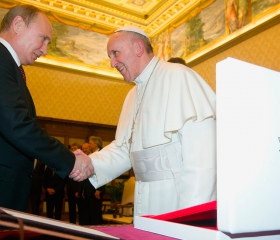A second meeting between Pope Francis and Vladimir Putin will take place on 10 June in Rome on the occasion of the Russian President’s visit to the Milan World Exposition — Expo 2015. There is no doubt that Putin’s trip to Italy has the primary objective of reaffirming the relevance of Russian-Italian relations under the circumstances of the current Ukrainian crisis. Nonetheless, it is clear that this meeting is also a new step in the Holy See’s diplomatic endeavors to prevent further drifts in Europe as well as in Russia’s efforts to enlarge its political “space of maneuver” in the chess-game with the West, whose stake is much bigger than Donbas or Ukraine herself.
A second meeting between Pope Francis and Vladimir Putin will take place on 10 June in Rome on the occasion of the Russian President’s visit to the Milan World Exposition — Expo 2015. There is no doubt that Putin’s trip to Italy has the primary objective of reaffirming the relevance of Russian-Italian relations under the circumstances of the current Ukrainian crisis, as the Russian President himself firmly stressed in his Moscow meeting with Prime Minister Renzi in March and in a recent interview with Italy’s leading daily Il Corriere della Sera. Nonetheless, it is clear that this meeting is also a new step in the Holy See’s diplomatic endeavors to prevent further drifts in Europe as well as in Russia’s efforts to enlarge its political “space of maneuver” in the chess-game with the West, whose stake is much bigger than Donbas or Ukraine herself.
What is the real significance of Putin’s consultation with the Pope, that was largely unpredicted by most Western observers?
The last meeting between the two leaders occurred in November 2013, before the eruption of the conflict in Ukraine. Since then relations between Moscow and the West have been deteriorating steadily, with Russia annexing Crimea last year and being accused of fomenting the ongoing war in eastern Ukraine, while the Holy See has increased its international mediating efforts, playing an important role among others in brokering the recent U.S.-Cuban deal.
The visit occurs only a few days after the Pope’s highly symbolic trip to Sarajevo in a country which, 20 years after the end of a slaughterous interethnic conflict, is still deeply divided by religion and ethnicity. In recent months the Pope made repeated appeals for an end to conflicts in Iraq, Syria, Gaza, Ukraine, and parts of Africa. In many of these conflicts Christians are often target of sectarian and religious hatred. The Catholic Church’s mediating message was reiterated in Sarajevo, where Francis invited Christian and Muslim communities to work together for peace and respectful coexistence through patient, trustful dialogue. Undoubtedly, the Pope is driven also by his broader concerns about the plight of humanity.
During a recent visit to an Italian military cemetery to commemorate the centenary of World War I Francis warned of the risk of a third world war ‘one fought piecemeal, with crimes, massacres, destruction’. In doing so, the Pontiff echoed the words of Benedict XV that in May 1915 called the war an ‘appalling butchery’ and in his famous note to the belligerents in August 1917 referred to it a ‘useless slaughter’.
Nonetheless, while the visit to Sarajevo proves the Vatican’s interest in maintaining dialogue between different confessions and preventing religious differences from turning into a trigger of conflict in Europe, Putin’s visit, with the Minsk agreement in the Donbass region having come under increasing pressure in the latest weeks, carries a special significance for the Holy See and the Kremlin.
In Western discourse Russia in often presented as the aggressor in the Donbas conflict and as the only responsible of the international system’s slow descent towards a new Cold War. The Kremlin is strongly engaged in rejecting these claims and the meeting with the Pontiff is an important achievement in this direction. While U.S. President Obama has lambasted Putin for wrecking the Russian economy in an attempt to recreate past imperial glories, the Russian President claims that Moscow is merely defending itself from outside encroachment. Moreover, it is widely known that Ukrainian Catholics are endeavoring to obtain support from the Vatican, which until now has referred to the conflict in Ukraine as a mere clash between Christians, never mentioning Russia as the aggressor. There cannot be doubt that President Putin has all the interest to preserve this state of things, preventing his enemies from obtaining a form of moral sustenance that might prove very effective both in the domestic and international realms.
Finally, there is one more issue which is central to the Holy See’s ecumenical vision and approach to Russia: Vatican diplomacy is making all possible efforts to organize an historical conference between the Pope and the Patriarch of Moscow Kirill, possibly on the occasion of the World Youth Day of Krakow in 2016. During his recent visit to Sarajevo the Pope stressed the importance of ecumenism and encouraged dialogue among religions in order to favor a peaceful settlement of disputes and to prevent the spread of religious violence and intolerance; the importance of this message in Pope Francis’ views could not be exaggerated. A positive atmosphere in relations between the Holy See and the Kremlin could favor Vatican’s steps towards the Russian Orthodox Church. It is obvious that both Russia and the Vatican have compelling reasons to manage a dialogue and understand each other. All this is not enough to state that a new Vatican Ostpolitik is in the making but the Pope could indeed posses much needed vision and charisma to contribute towards a better understanding between Moscow and the West.





